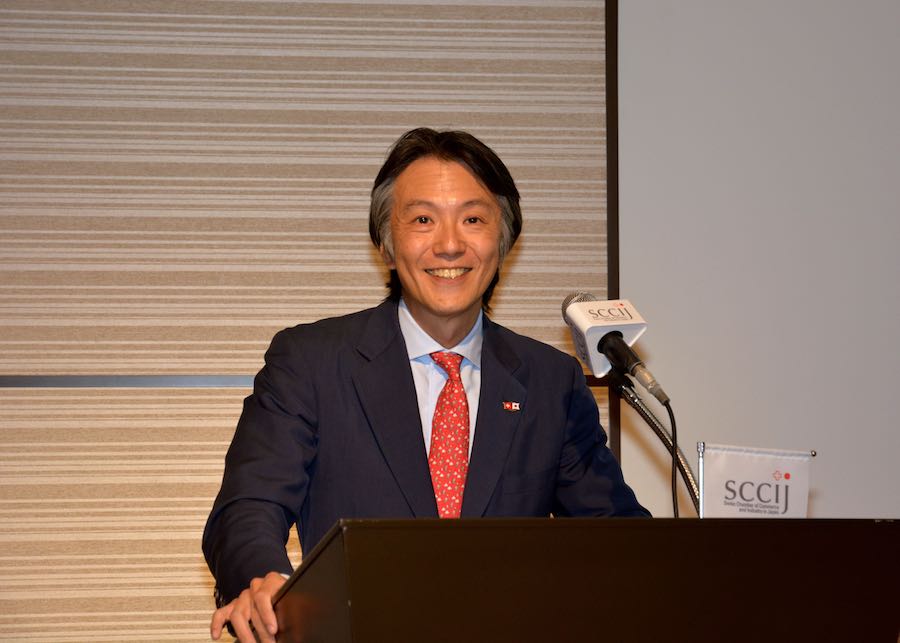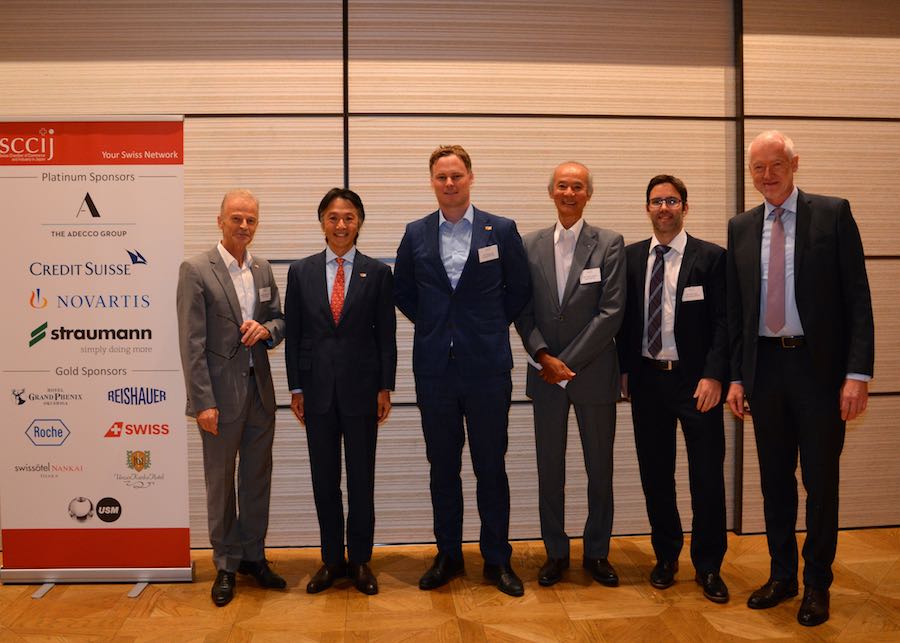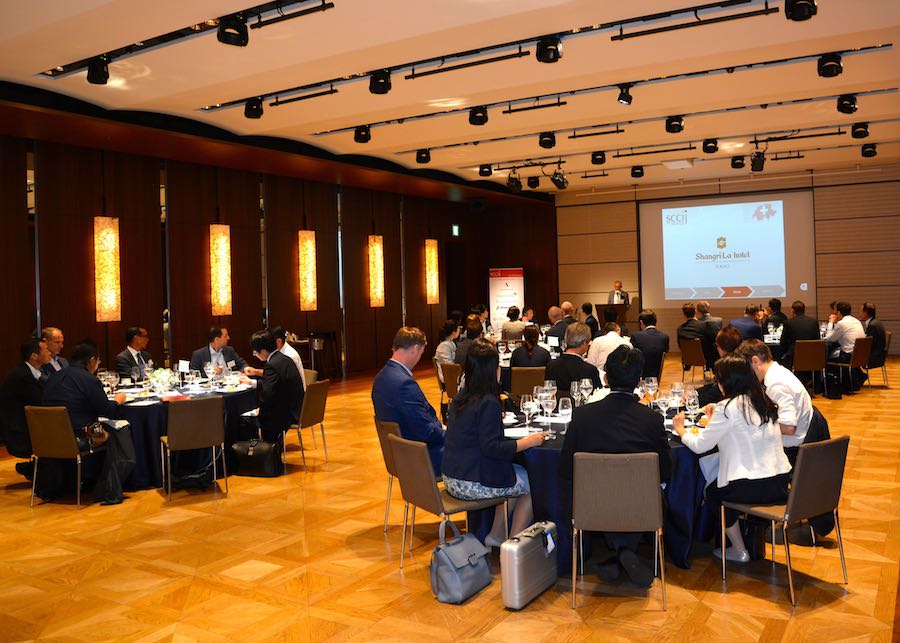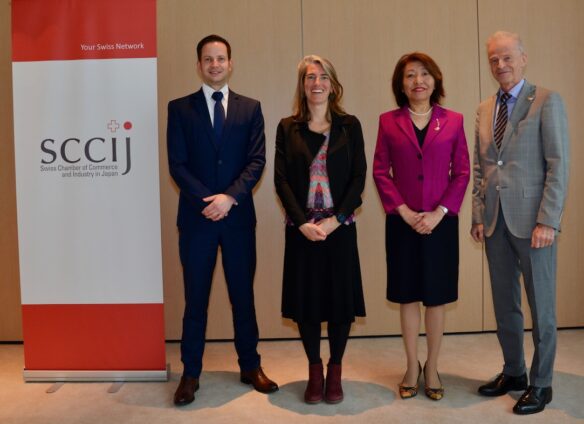Tokyo (SCCIJ) – “Today’s globalization, diversity, and interdependence require additional competencies to run, manage, and lead teams.” This statement was the core message of the September luncheon speech by Mr. Naoshi Takatsu, Managing Partner (North-East Asia) of the Swiss business school IMD. His challenging arguments fueled a lively discussion with his audience of about 40 members and guests of the SCCIJ.

SCCIJ September Luncheon speaker Mr. Naoshi Takatsu, Managing Partner (North-East Asia) of the Swiss business school IMD
Classic and modern leader qualities
Mr. Takatsu started his talk with some food for thought. Leadership would not be any more a property of those with big titles but everyone’s business, he stated. Some classic leadership competencies are constant, while some new behaviors and attitudes are required. This need was due to the rise of a volatile, uncertain, complex and ambiguous world, he said.
Mr. Takatsu named five leadership qualities needed in the analog as well as the digital era. “These qualities are decisiveness, integrity, charisma, resilience and communication skills,” he said. But the digital and global economy would require more agile leaders with a remarkable consistency across industries and geographies.
“Four characteristics distinguish agile from non-agile leaders,” the speaker stated on the basis of IMD research. First, such leaders are humble and able to accept feedback and acknowledge that others know more than they do. Second, they are adaptable and take change as a constant. Also, they realize that changing their mind based on new information is a strength rather than a weakness.
This ability to adapt would be in permanent tension with the third factor of being visionary, he said: Such agile leaders have a clear sense of long-term direction, even in the face of short-term uncertainty. Finally, they are engaged and have a willingness to listen, interact, and communicate with internal and external stakeholders combined with a strong sense of interest and curiosity in emerging trends.
Focus on organizational changes
One large challenge of today’s leaders would be the digital business transformation. Mr. Takatsu quoted IMD Professor Michael Wade, Director, Global Center for Digital Business Transformation who argues that digital business transformation is about more than devices and software. “It is about organizational change through the use of digital technologies and business models to materially improve performance,” the quote of Wade goes.
This transformation needs an approach different from the traditional change management, Mr. Takatsu argued. One reason is interconnectivity: In the digital vortex, all the industries are affected in one way or the other. To change or launch something in an incumbent company, you need to connect many resources ranging from people to data and infrastructure, within and outside the company.

Members and advisors of the SCCIJ Executive Committee with September luncheon speaker Mr. Naoshi Takatsu
Factors of business agility
Thus, companies and their leaders needed digital business agility to respond and react to digital disruption. Mr. Takatsu named three essential response factors. With hyper-awareness, a company can detect and monitor changes in its business environment. Informed decision-making enables a company to make the best decision in a given situation.
A third factor is fast execution, defined as a company’s ability to carry out its plans quickly and effectively. Companies would cope better with digital disruption if their leaders have those required four qualities which he had outlined at the beginning of his presentation, Mr. Takatsu said. They can be summarized with the acronym HAVE standing for “Humble, Adaptable, Visionary, Engaged”.
In response to a question, the speaker emphasized that these four characteristics were also already useful in the past. But in the new environment, they would have become more critical. As a recent development, Mr. Takatsu mentioned the ability to empathize as an emerging necessity to be an effective leader. “Globalization causes encounters with more diverse people and data and thus may require an additional quality of leadership,” the speaker argued.

SCCIJ September Luncheon about “Fundamental shifts in leadership”
Biography of the speaker
Mr. Takatsu graduated from Waseda University (Political Sciences and Economics) and obtained an MBA from INSEAD in France. He also studied at Kuwasawa Design School in Tokyo. Throughout his career, Mr. Naoshi Takatsu has taken advisory roles for Japanese companies in globalization: In investment banking (at the Industrial Bank of Japan), in strategy (at BCG), and in HR/HRD/OD areas (at Recruit Holdings).
He now consolidates these experiences to support Japanese companies and the business community through his affiliation with IMD business school. He has taken an active part in IMD’s design and delivery of customized global executive development programs for AGC, JT/JTI, Kao, MUFG, NTT Group, Sumitomo Corporation, among others. Participation of Japanese executives to IMD’s open enrolment executive education programs, held mostly in Lausanne, has substantially increased since he started to represent the school in 2010.
Text and pictures: Martin Fritz for SCCIJ





























